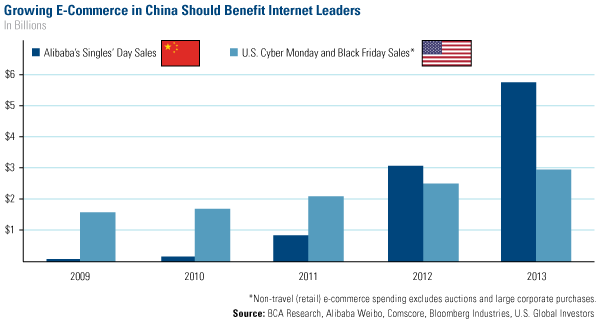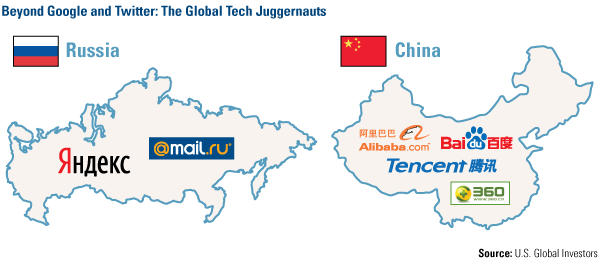If I asked you to name the biggest online shopping day of the year, what would you guess? Black Friday? Cyber Monday? Free Shipping Day in mid-December?
Guess again.
Even though Cyber Monday sales were spectacular this year, as online sales surged 20 percent and beat Black Friday receipts, the day didn’t top November 11, Singles’ Day in China. Singles’ Day is a day of celebration for people who are single and has become popular among the young in China.
China saw so many online purchases on this day that sales exceeded Black Friday and Cyber Monday online purchases in the U.S. In fact, sales on Singles’ Day were nearly double that on Black Friday and Cyber Monday. According to BCA Research, transactions processed through Alibaba totaled $5.75 billion on 11/11. Online sales on Black Friday and Cyber Monday together were only about $3 billion. Online transactions have grown so quickly in China over the past few years, the country may have surpassed the U.S. in becoming the largest e-commerce market in the world. The spectacular growth also “defies the widely held consensus of China’s perceived ‘weak’ consumption,” says BCA.
Online transactions have grown so quickly in China over the past few years, the country may have surpassed the U.S. in becoming the largest e-commerce market in the world. The spectacular growth also “defies the widely held consensus of China’s perceived ‘weak’ consumption,” says BCA.
The Asian country has become one of the best consumption stories out there, and looking over the next few years, local technology companies are almost certain to benefit.
So while many U.S. investors are getting excited about the growing number of initial public offerings in the tech sector, they would be remiss if they didn’t look beyond Silicon Valley.
After all, the world has drastically changed since the last tech boom. Back then, China’s share of world GDP growth was in the single digits; now its share is close to 20 percent. Former state-run economies, such as China and Russia, are embracing an entrepreneurial spirit and markets are continuing to open up.
We’re especially excited about the opportunities that will likely develop from China’s removal of the hukou system that determines residency status and urbanization trends. In addition, as China changes its one-child policy, Internet companies may likely see an even larger increase of users in the years ahead.
Do They “Google” in China?
Americans may “Google” for directions, recipes or stock prices, post to Twitter, and shop online at Amazon or eBay, but outside the U.S., different tech leaders are finding lucrative and innovative ways to shape online experiences, grow revenue, and gain market share.
Baidu, for example, is the search engine leader in China with an 81 percent market share, significantly overshadowing Google, which has only a 12 percent revenue share, according to CLSA. The research firm anticipates Baidu will “sustain 35-40 percent revenue growth,” due to its monetization in search advertising, mobile games and mobile videos.
Competition is heating up though. When U.S. Global analyst Xian Liang visited his family in Shanghai this year, he noticed the Internet search page automatically populated to Qihoo (pronounced “chee-hoo”). Qihoo, which has only about 15 to 20 percent traffic share in China right now, bundles its own search engine along with its Internet security software. After installing the anti-virus software, the search engine becomes the default. The company is using this strategy to gain market share against heavy competitors such as Baidu and Google.
When purchasing goods online, most residents of China head to Alibaba, which processes about 80 percent of China’s total online retail businesses. It has a unique model with Amazon- and eBay-like features and hosts sites for small businesses. Its volume of sales is so massive, Alibaba may overtake Wal-Mart as the world’s largest retail network by 2016, according to CNBC.
As an “undisputed market leader,” Alibaba enjoys revenues that are growing 60 to 70 percent year-over-year, says CLSA. Yahoo! has benefited from its 24 percent stake in Alibaba, and next year, investors could get in on the action if the company goes public.
Michael Ding, portfolio manager of the China Region Fund (USCOX), likes Tencent Holdings, whose subsidiaries provide mass media, Internet and phone services, social media and online advertising. According to CLSA, Tencent is “best positioned for mobile,” due to its app called WeChat.
Users of Tencent’s phone applications may not be all too familiar with an app called SnapChat, but they are feverishly downloading a new app called WeChat. WeChat is a mobile social networking application that allows real time multi-party voice messaging and location sharing, boasting 236 million monthly active users.
Tech in Asia reported that Tencent is now set to open a WeChat office in the Philippines, saying that WeChat “became the most downloaded free app” in the country since June. Exploring Russia 2.0
Exploring Russia 2.0
Another area of the emerging world benefiting from the growing wealth of the consumer is Russia. In our recent webcast, Tim Steinle, portfolio manager of the Emerging Europe Fund, talked about investing in “Russia 2.0” companies. Whereas familiar Russian companies, such as Gazprom and Lukoil, tend to be large and state-owned, we prefer dynamic, independent, shareholder-driven companies.
For example, Mail.Ru is an Internet company focused on social networks and gaming. Yandex is the dominant Internet portal in Russia in direct competition with Google.ru, the Russian operation of Google. Both companies have been outstanding performers compared to overall Russian stocks in 2013.
Curious to learn more about global markets? On the Frank Talk blog, Frank Holmes often shares his insights on emerging markets, resources and gold. Share your email address with us and we’ll send you a note the next time he posts to his blog. You can also keep informed by following U.S. Global Investors on Twitter or Facebook.
Please consider carefully a fund’s investment objectives, risks, charges and expenses. For this and other important information, obtain a fund prospectus by visiting www.usfunds.com or by calling 1-800-US-FUNDS (1-800-873-8637). Read it carefully before investing. Distributed by U.S. Global Brokerage, Inc.
Foreign and emerging market investing involves special risks such as currency fluctuation and less public disclosure, as well as economic and political risk. By investing in a specific geographic region, a regional fund’s returns and share price may be more volatile than those of a less concentrated portfolio. The Emerging Europe Fund invests more than 25% of its investments in companies principally engaged in the oil & gas or banking industries. The risk of concentrating investments in this group of industries will make the fund more susceptible to risk in these industries than funds which do not concentrate their investments in an industry and may make the fund’s performance more volatile.
Holdings in the funds mentioned as a percentage of net assets as of 9/30/13: Amazon 0.0%, Baidu 0.0%, eBay 0.0%, Google 0.0%, Gazprom (Emerging Europe Fund 4.05%), Lukoil (Emerging Europe Fund 4.75%), Mail.Ru (Emerging Europe Fund 2.89%), Qihoo (China Region Fund 3.01%), Tencent (China Region Fund 3.51%), Twitter 0.0%, Wal-Mart 0.0%, Yandex (Emerging Europe Fund 1.95%), Yahoo! 0.0%
- English (UK)
- English (India)
- English (Canada)
- English (Australia)
- English (South Africa)
- English (Philippines)
- English (Nigeria)
- Deutsch
- Español (España)
- Español (México)
- Français
- Italiano
- Nederlands
- Português (Portugal)
- Polski
- Português (Brasil)
- Русский
- Türkçe
- العربية
- Ελληνικά
- Svenska
- Suomi
- עברית
- 日本語
- 한국어
- 简体中文
- 繁體中文
- Bahasa Indonesia
- Bahasa Melayu
- ไทย
- Tiếng Việt
- हिंदी
China's Singles Know How To Spend
Published 12/23/2013, 02:37 PM
Updated 07/09/2023, 06:31 AM
China's Singles Know How To Spend
Latest comments
Loading next article…
Install Our App
Risk Disclosure: Trading in financial instruments and/or cryptocurrencies involves high risks including the risk of losing some, or all, of your investment amount, and may not be suitable for all investors. Prices of cryptocurrencies are extremely volatile and may be affected by external factors such as financial, regulatory or political events. Trading on margin increases the financial risks.
Before deciding to trade in financial instrument or cryptocurrencies you should be fully informed of the risks and costs associated with trading the financial markets, carefully consider your investment objectives, level of experience, and risk appetite, and seek professional advice where needed.
Fusion Media would like to remind you that the data contained in this website is not necessarily real-time nor accurate. The data and prices on the website are not necessarily provided by any market or exchange, but may be provided by market makers, and so prices may not be accurate and may differ from the actual price at any given market, meaning prices are indicative and not appropriate for trading purposes. Fusion Media and any provider of the data contained in this website will not accept liability for any loss or damage as a result of your trading, or your reliance on the information contained within this website.
It is prohibited to use, store, reproduce, display, modify, transmit or distribute the data contained in this website without the explicit prior written permission of Fusion Media and/or the data provider. All intellectual property rights are reserved by the providers and/or the exchange providing the data contained in this website.
Fusion Media may be compensated by the advertisers that appear on the website, based on your interaction with the advertisements or advertisers.
Before deciding to trade in financial instrument or cryptocurrencies you should be fully informed of the risks and costs associated with trading the financial markets, carefully consider your investment objectives, level of experience, and risk appetite, and seek professional advice where needed.
Fusion Media would like to remind you that the data contained in this website is not necessarily real-time nor accurate. The data and prices on the website are not necessarily provided by any market or exchange, but may be provided by market makers, and so prices may not be accurate and may differ from the actual price at any given market, meaning prices are indicative and not appropriate for trading purposes. Fusion Media and any provider of the data contained in this website will not accept liability for any loss or damage as a result of your trading, or your reliance on the information contained within this website.
It is prohibited to use, store, reproduce, display, modify, transmit or distribute the data contained in this website without the explicit prior written permission of Fusion Media and/or the data provider. All intellectual property rights are reserved by the providers and/or the exchange providing the data contained in this website.
Fusion Media may be compensated by the advertisers that appear on the website, based on your interaction with the advertisements or advertisers.
© 2007-2025 - Fusion Media Limited. All Rights Reserved.
